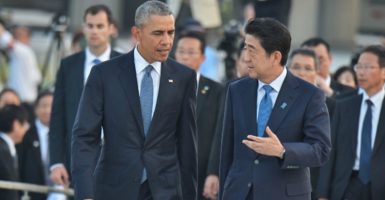Japanese Prime Minister Shinzo Abe announced he would travel to Pearl Harbor later this month, the first Japanese leader to do so.
Abe commented he would accompany President Barack Obama to “pay tribute [and] comfort the souls” of those who died from both countries during World War II.
He emphasized his intent to “send messages about the importance of reconciliation” between the U.S. and Japan, former wartime enemies who became strong allies.
Abe’s visit, if not a quid pro quo for Obama’s visit to Hiroshima in May, makes a fitting counterpart to that trip, marking the alpha and omega of World War II in the Pacific.
In that sense, the two trips serve the same purpose as the USS Missouri, the location of the August 1945 signing of the treaty ending World War II. The Missouri is now moored next to the wreck of the USS Arizona, which was sunk during the December 1941 attack on Pearl Harbor.
Abe’s remarks at Pearl Harbor will be scrutinized for indications of Japanese remorse for its wartime hostilities. But Abe has already made several speeches striking a contrite tone.
During an April 2015 visit to Washington, he commented on his visit to the World War II Memorial, highlighting the battles of Pearl Harbor, Bataan, Corregidor, and the Coral Sea.
The prime minister expressed “eternal condolences” and “deep repentance” for the “lost dreams and lost futures of those young Americans.” Abe acknowledged “our actions brought suffering to the peoples of Asia, and vowed again to “uphold the views expressed by the previous prime ministers.”
In August 2015, Abe commemorated the 70th anniversary of the end of World War II by releasing a statement to make amends to Japan’s neighbors. Abe went further in acknowledging Japan’s wartime actions.
In December 2015, Abe and South Korean President Park Geun-hye were able to forge an agreement that provided a foundation for reconciliation of difficult historic issues arising from Japan’s 1910-1945 occupation of the Korean Peninsula.
America is often accused of having a short memory. But World War II remains a bedrock historic era and a lodestar for America’s sense of who we are as a country.
Pearl Harbor made clear that isolationism was not a viable way to avoid the dangers of the world. Withdrawing from the world and raising the drawbridge did not deter America’s enemies. The same is true today.
The United States arose phoenix-like from the devastation of Pearl Harbor and America’s “Greatest Generation” endured the crucible of war to bring peace and stability to the Pacific.
The U.S. and Japan overcame the animosity of conflict to become enduring partners and allies. That dichotomy is both a realization of Thomas Jefferson’s warning that “the price of freedom is eternal vigilance” and a symbol of what democracies can achieve together.































